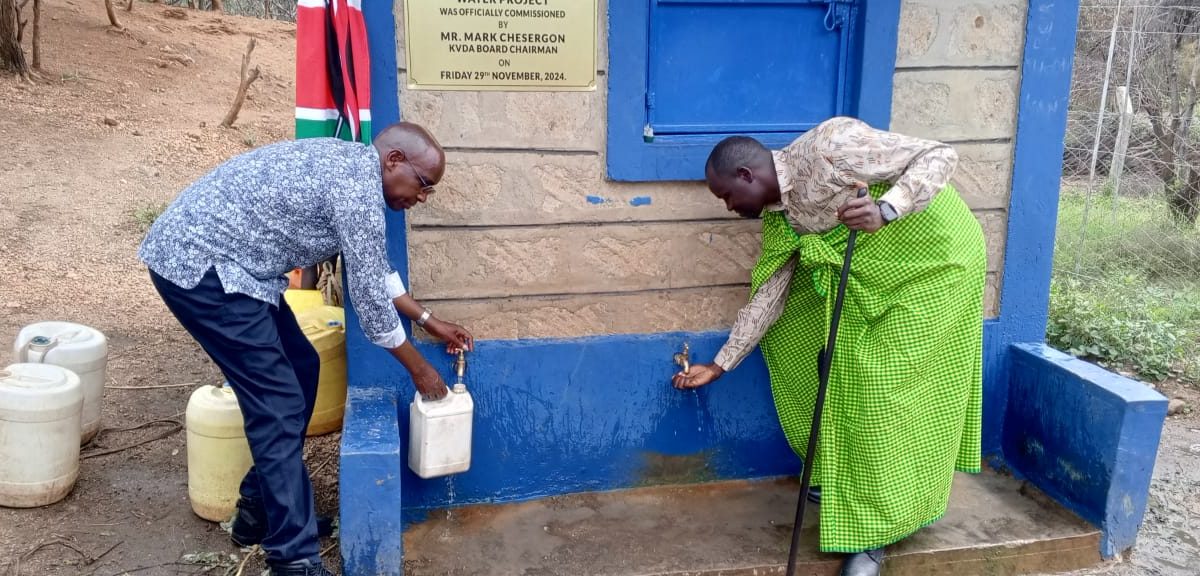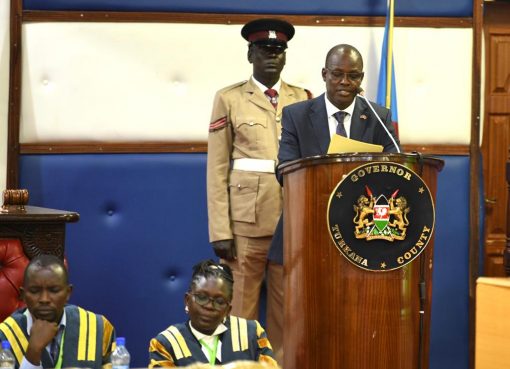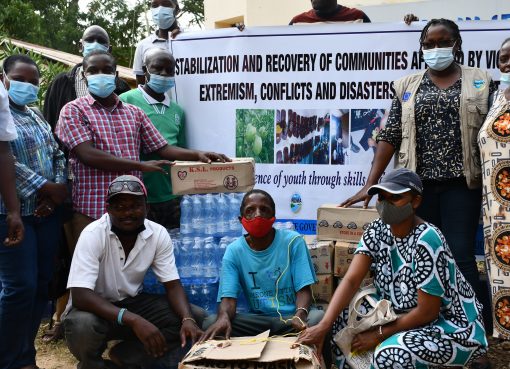The Kerio Valley Development Authority (KVDA) has commissioned two Sh80 million boreholes in the Masol ward of Pokot Central Sub County to improve livelihoods for the local communities, promote peace, foster agricultural activities and help enhance overall food security.
According to the Authority, the two boreholes are part of the government’s broader efforts to combat the effects of climate change and mitigate the severe drought experienced in this region, which is considered one of the most arid and semi-arid areas of West Pokot County.
Speaking during the launch of the two boreholes at Kalas village in Masol Ward, the managing director of the Kerio Valley Development Authority, Sammy Naporos, stated that the two boreholes and the ongoing rehabilitation of water bans aim to improve livelihoods for the local communities, promote peace, foster agricultural activities and help enhance overall food security.
He further said that access to water is expected to reduce competition over scarce resources especially water.
Naporos said that the initiative is part of the government intervention, that represents a crucial step towards enhancing resilience against climate impacts and improving the quality of life for the residents of Masol ward.
He said for decades, Masol ward has faced marginalization, largely due to the migration of many individuals from the area in response to banditry attacks along the West Pokot-Turkana border.
“Masol ward is characterized by the most arid and semi-arid lands within West Pokot County, suffering the most severe effects of drought compared to other areas in the Kerio Valley region,” Naporos said.
He indicated that KVDA is undertaking several drought mitigation initiatives in the Kerio valley region, facilitated by government intervention aimed at addressing the impacts of climate change in the nation as well as fostering peace among communities.
Naporos announced the launch of five programs, which include the construction of two boreholes in Kalas and Amuto villages, as well as three water pans located at Cheparkuei, Selenka, and Lodong’ot, and Chepserum.
‘‘The total investment for these water projects amounts to 80 million,’’ Naporos highlighted.
He expressed gratitude to the government and parliament for their support, which has enabled KVDA to execute the water project and other development projects through the allocation of necessary funds and resources.
‘‘This initiative is expected to benefit 5,000 households for domestic use and provide water for 200,000 livestock,’’ he said.
The managing director emphasized that the water project will significantly enhance livelihoods in the region.
He also disclosed that Sigor constituency faces persistent drought challenges and border insecurity, particularly in the Kerio Valley border areas, including Sigor, Turkana South, and Turkana East.
He noted the existence of various collaborative programs in these border regions, particularly dams that foster community cohesion, such as those in Kadeng’oi and Lodong’oi, which serve both Sigor and Turkana East constituencies.
Naporos added that the water project offers relief to communities that have struggled to access water, often having to travel long distances in search of it, and also supports peace initiatives along the borders of West Pokot and Turkana counties.
Additionally, the Chairman of KVDA, Mark Chesergon, stated that the water projects commissioned are part of the government’s drought mitigation program, which aims to provide the residents of the Kerio Valley area with access to clean water for both domestic use and livestock.
Chesergon emphasized that the authority will prioritize the implementation of its projects throughout the regions covered by KVDA.
He noted that this initiative is a long-term commitment by the government to assist residents in the more remote areas of the county, where water scarcity is primarily exacerbated by the impacts of climate change, thereby facilitating access to water for their needs and development plans.
The Member of Parliament for Sigor Constituency and Regional Development Chairperson at the National Assembly Peter Lochakapong, expressed his gratitude for the inauguration of water projects in his constituency, specifically in the Kalas and Amuto villages, where boreholes were officially handed over to the community for their management and use.
Lochakapong highlighted the critical water shortages faced by residents for both personal and livestock needs, noting that the introduction of two boreholes, along with the ongoing rehabilitation of water pans in the region, would significantly alleviate the water-related challenges that have persisted for decades.
He remarked on the visible joy and satisfaction of the residents during the borehole launch, which he interpreted as a positive reception of the water initiatives in their area.
Furthermore, he pointed out that Masol Ward, located within the Sigor constituency, requires additional resources to enhance water projects, improve road networks, and implement other developmental initiatives.
He also revealed that Masol Ward in West Pokot County has faced significant insecurity issues due to banditry, which previously led to the displacement of residents to neighboring wards such as Sekerr, Lomut, and Weiwei.
However, since his election, he said incidents of insecurity have reduced, fostering a renewed sense of peaceful coexistence among the community members.
Lochakapong emphasized that the government’s initiative to implement water projects in the region is part of a broader strategy to promote peace and cohesion among communities by providing essential resources that have historically been a source of conflict.
He urged the government to consider the construction of additional roads within the constituency to facilitate better access for residents to various areas.
Assistant Chief Daniel Tios of the Amalat Sub-location in Chesogon, Pokot Central Sub-County, stated that the area has been lacking a borehole.
He emphasized that the boreholes commissioned by the Kenya Valley Development Authority (KVDA) would significantly benefit residents by providing water for both domestic use and livestock.
He noted that residents have been traveling 15 kilometers to access water from the Kerio River.
“We are pleased that the people and livestock of Kalas village will now have access to clean water for both animals and domestic purposes, unlike in the past,” Assistant Chief Tios remarked.
He further explained that the availability of water would reduce the need for residents to relocate in search of water for themselves and their animals.
A resident of Kalas, Julius Loparar, appreciated the fact that the water initiative has made the community feel the government’s presence and its potential to contribute to development, particularly in providing water for those living in arid and semi-arid lands (ASAL).
He urged the government to consider drilling additional boreholes in the region, especially in remote areas facing water scarcity.
By Anthony Melly and Agneta Chebet





